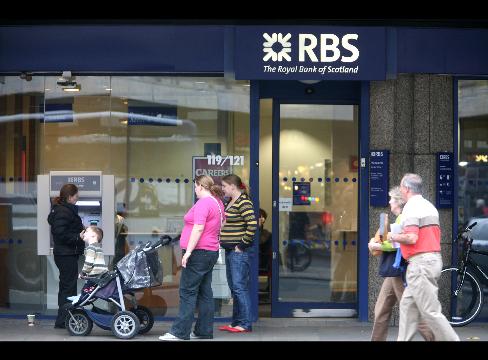
Pedestrians walk past a branch of Royal Bank of Scotland in London on Oct. 13, 2008. Photographer: Jason Alden/Bloomberg News
Jan. 19 (Bloomberg) — Royal Bank of Scotland Group Plc said it may post a loss of as much as 28 billion pounds ($41 billion), the biggest ever reported by a U.K. company, as the credit crisis worsens. The stock slumped as much as 46 percent.
Britain’s biggest government-controlled bank may post a full-year loss before exceptional goodwill impairments of as much as 8 billion pounds, Edinburgh-based RBS said in a statement today. In addition, the bank may write down the value of past acquisitions by as much as 20 billion pounds.
Related articles:
– RBS shares dive 70% on mounting debt fears (Times Online)
– RBS Plummets Amid Concern Bank May Be Nationalized (Bloomberg)
– British banks are ‘technically insolvent’ (Independent)
– ANOTHER £100BN BAIL-OUT FOR ‘INSOLVENT’ BANKS (Daily Express)
– UK is in freefall, warns think-tank (The Observer)
The loss would eclipse Vodafone Group Plc’s 22 billion- pound net loss in 2006. RBS has been crippled by its acquisition of ABN Amro Holding NV’s investment banking assets three months before the credit crisis began, a takeover Chancellor of the Exchequer Alistair Darling today called “disastrous.” The Treasury said today it may raise its stake in RBS as it announced the second British bank rescue in three months.
“I am angry at the Royal Bank of Scotland and what has happened,” Prime Minister Gordon Brown told reporters in London today. The bank took “irresponsible risks,” in investing in U.S. subprime mortgages and ABN Amro, he said.
RBS shares dropped as low as 18.9 pence and traded down 43 percent at 20 pence at 1 p.m. in London trading, their lowest value since at least September 1988. Barclays Plc dropped 10 percent to 88.2 pence. Lloyds Banking Group Plc dropped 25 percent to 74 pence, as the bank said it still plans to repay the government’s preference shares by the end of the year.
‘Full-scale Nationalization’
“Full-scale nationalization” is the most likely next step for RBS “if the latest initiative proves insufficient,” Nomura analysts Robert Law and Raul Sinha said in a note to clients today. The bank may be forced to raise more cash from investors, diluting existing shareholders’ stakes, until the full scale of credit losses is known, they added.
Chief Executive Officer Fred Goodwin spent almost $90 billion on takeovers after he became CEO in 2000, culminating in his 14.3 billion-euro ($19 billion) acquisition of ABN Amro in 2007. Goodwin was ousted in October after the government agreed to take control of the 282-year-old Scottish lender.
“The previous management made this disastrous acquisition of Dutch bank ABN,” Darling told BBC Radio 4 today.
‘Truly Horrible’
“The numbers are truly horrible,” said Robert Talbut, who helps manage about $31 billion at Royal London Asset Management. “The government is very clearly in the driving seat, and I would expect RBS to shrink back to being a more U.K.-focused bank.”
RBS said it expects to post 8 billion pounds of credit market writedowns for the full year, boosted by losses on U.S. collateralized debt obligations. Credit impairment losses may total as much as a further 7 billion pounds, including a 1 billion-pound loss on its loan to bankrupt chemical maker Lyondell Chemical Co.
“We can all be sure there will be further significant credit losses, but we can’t be sure of what amount and what timing,” Stephen Hester, who replaced Goodwin as CEO, told reporters on a conference call today. “Significant uncertainties and risks inevitably remain.”
RBS issued its statement on the same day that the Bank of England announced measures worth an additional 100 billion pounds to help banks access liquidity and boost lending. The package is in addition to the 250 billion pounds Gordon Brown committed in October.
‘Restructure and Retrench’
The bank will cut lending in international markets which saw “most of the excess balance sheet expansion” under Goodwin, Hester said today. “We are going to restructure and retrench to our most valuable customer franchise business,” in the U.K.
Royal Bank of Scotland plans to replace the U.K. Treasury’s preference shares, which carry a dividend, with ordinary stock. RBS shareholders will be offered 5 billion pounds of shares for 31.75 pence apiece, the bank said. If shareholders fail to take up their rights, the government’s stake in the bank will increase to 70 percent from 58 percent.
Lloyds, the U.K.’s biggest mortgage lender, said today it would stick with its plan to repay the government’s 4 billion pounds of preference shares by the end of the year. Lloyds may be doing so to avoid following RBS into government control, Simon Willis, an analyst for U.K. financial stocks at NCB Stockbrokers Ltd. in London, said in a telephone interview today.
“They are resisting for as long as they can, but I suspect in due course will be majority government-owned due to rising bad debts on the back of a deterioration in the U.K. economy,” Willis said.
RBS said today it would use the money saved by eliminating the dividends on the preference stock to boost U.K. lending by 6 billion pounds. Increased lending to U.K. customers will only be on “commercial terms and to creditworthy people,” Hester said.
To contact the reporter on this story: Jon Menon in London at
Last Updated: January 19, 2009 08:07 EST
By Jon Menon
Source: Bloomberg
What do I think to the Royal bank of scotland? RBS boss Fred goodwin should be stripped of his pension. If they pay him a profit related percentage he will get minus figures. Taking away his pension is the best option.